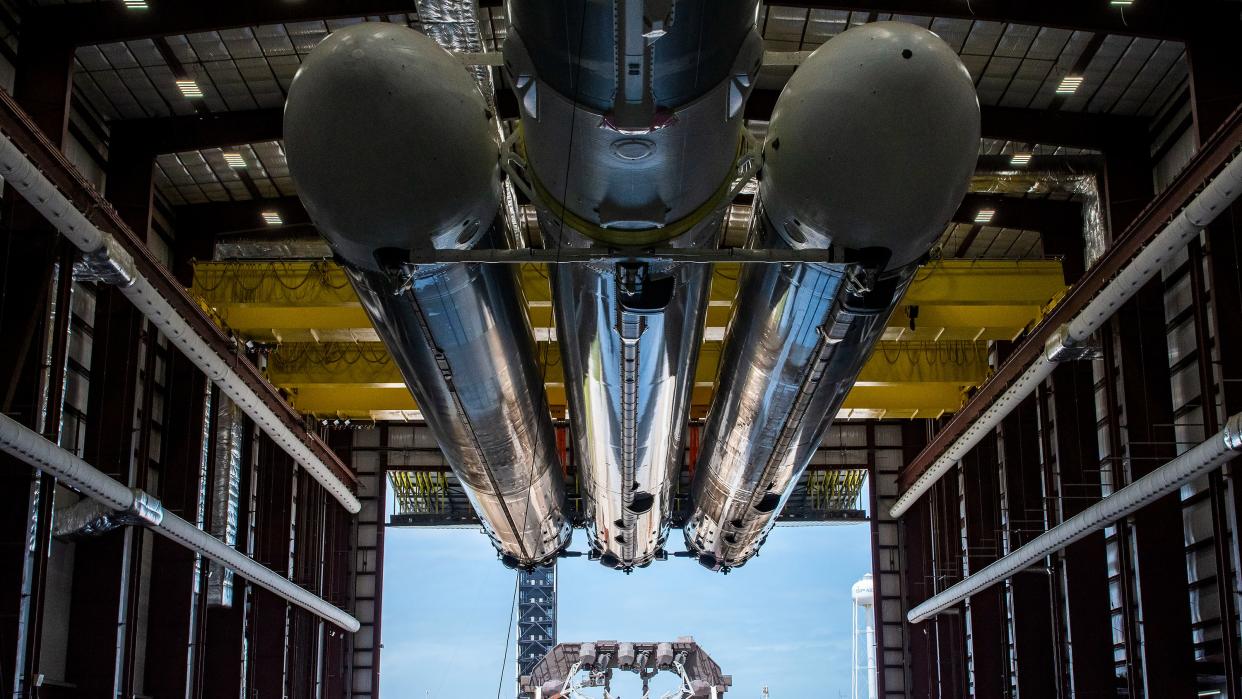SpaceX, ULA could launch missions for Europe while it waits for its next-generation rocket: report

Delays in Europe's next-generation launch vehicle, the Ariane 6, are causing the European Commission to seek alternatives for the countries' access to orbit.
With the Ariane 5 months away from retirement, and its predecessor not expected to be in operation until next year, EU countries are hoping to get approval to negotiate "an ad-hoc security agreement" to sign contracts for American launch vehicles such as SpaceX's Falcon Heavy rocket in the interim, according to a report by Politico published Monday (April 17).
Specifically, the Commission is interested in launch vehicles to support Europe's Galileo GPS satellites, which serve as a distinguishing mark for the continent's space program. These hefty spacecraft weigh over 1,540 pounds (700 kilograms) and are capable of relaying extremely precise navigation and location data back to the ground. They also transmit encrypted data marked top secret for various EU governments. And therein lies a few of the complications.
Related: Europe's long-awaited Ariane 6 rocket won't launch before late 2023
French-based company ArianeGroup manufactures the Ariane 5 and Ariane 6 rockets, which launch from the European Space Agency (ESA) Spaceport in French Guiana, South America. ESA also operates the Galileo satellite.
Because the manufacture and launch of Galileo satellites has been handled entirely in Europe, the EU's security concerns surrounding the classified aspects of the spacecraft have so far been minimized. There is far more red tape involved in getting classified satellites to space using a different country's launch vehicle, however.
The European Commission first sought out Galileo launches aboard Russian Soyuz rockets, which ESA also is capable of facilitating at its French Guiana spaceport, but two canceled launch attempts since Russia's war on Ukraine forced the Commission to search for other options. Aside from the Ariane 5 and Soyuz, the only other operational rocket capable of carrying the satellite's bulk is SpaceX's Falcon Heavy.
The upcoming Vulcan Centaur rocket from United Launch Alliance (ULA) would also be a viable launch vehicle for Galileo. While its debut is currently scheduled for May, realizing the addition of an EU launch to the brand new rocket's manifest before the end of 2024 doesn't seem very likely.
Now, with a backlog of Galileo launches dating as far back as 2017, Falcon Heavy may be poised to fill the gap.
RELATED STORIES:
— Russia's war on Ukraine has caused lasting damage to international spaceflight cooperation
— Meet Ariane 6 and Vega C: Europe's New 'Rideshare' Rockets (Videos)
— Ariane 5: European Heavy-Lift Rocket
According to Politico, the choice will ultimately be left to the EU nations, and whether their policies regarding the handling of classified materials will permit Galileo to fly aboard Falcon Heavy or Vulcan Centaur while the Ariane 6 inches slowly toward its first flight.
The Ariane 5 made its penultimate flight earlier this month on April 14, launching Europe's flagship Juipiter Icy Moons Explorer (JUICE) on an eight-year journey to the gas giant where it will assess the potential habitability of some of the planet's moons.
Follow us @Spacedotcom, or on Facebook and Instagram.

